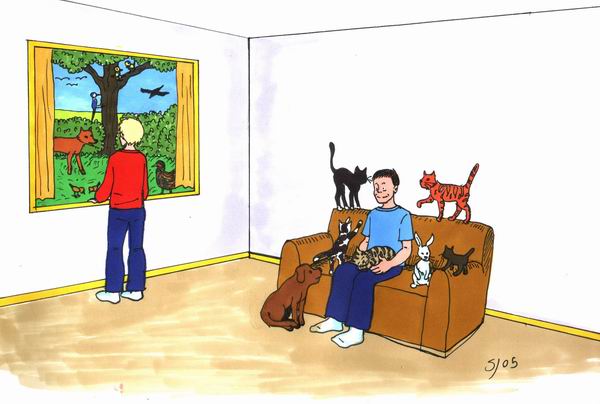Don't we have too many pets?
When parents are asked whether they think having pets is good for the development of a child, most of them will be surprised and say 'Yes of course it is'. But is this really the case? We are asking parents to reflect on the issues raised in this article, in order to help them reach a deliberate decision. Research by Nienke Endenburg at the Dutch University of Utrecht shows that 14% of all people in Holland have pets, because they expect that it'll be good for the development of responsibility of their child. In a poll of a Dutch public broadcaster) and a Dutch newspaper in April 1999, people answered as follows. How important are pets for the upbringing of a child?
- very important 45%
- important 40%
- not very important 7%
- unimportant 6%
- very unimportant 1%
- no opinion 2%
|
Pet statistics
There are about 13 million pets in Britain with just over 50 percent of households owning one. Holland with its population of 17 million inhabitants count over 3.5 million cats and dogs. Every year about 70.000 of them end up in animal shelters. For all other animals that cannot and should not be kept in captivity many organisations were forced to create a lot of shelters. Most pets (like birds and fish) can't be caressed and are kept only 'because they're nice to look at'. |
Kind of pet |
Numbers kept in Holland |
| Aquarium fish |
2.9 million |
| Singing and tropical birds |
2.6 million |
| Cats |
2.2 million |
| Pond fish |
2 million |
| Dogs |
1.5 million |
| Pigeons |
1 million |
| Rabbits |
0.6 million |
| Other rodents |
0.4 million |
| Horses and ponies |
0.2-0.4 million |
| Reptiles and amphibians |
0.1 million |
|
 |
Are pets good for the development of a child?
In de 'Telegraaf' (Dutch newspaper) printed on Animal Day (4th of October) it's even stated that 'children having pets are more intelligent than children without them'. This is nonsense, ofcourse, but still. A pet can be fun for the child, but is the child always fun for the animal? To be certain whether a child takes care of a pet in a responsible way, the animal should be able to indicate whether or not this is the case. Maybe a dog or cat can express how it feels, but what about a bird or a rabbit? Or even more difficult: how do you know that a turtle or fish feels OK? We only know for certain that the animal wasn't feeling well in case of illness or death. Considering that an animal's value is usually expressed in terms of money, it is opportune for some people to dispose of sick animals (either kick it out or let it die) rather than spend money on an expensive vetinary surgeon.
The consequences for the animal because of child behaviour
The well being of most pets is hard to determine, especially for children. Most pets reach the age between 3 and 15 years. For children that's a very long time to oversee. When they loose interest in the animal after a certain period of time, the animal will become very lonely. Most of the day, when the children are at school or are asleep, the pet's alone. When the animal needs to be fed it will get some attention and maybe also on other occasion's, but most of the day it is locked up without any attention. Parents will have to take on most of the responsibilities (like walk a dog etc.). Small children sometimes carry pets around endlessly; they treat animals like toys. Sometimes children will take out their frustrations about their own powerlessness on the animal. The consequence is that the animal will bite the child. When the parent doesn't see why such a thing happened, the animal will be blamed; it evidently cannot tell the true story. A children's farm would be a good place for children to see and touch animals. Unfortunately, because of lack of supervision (as a result of lack of money) and due to poor upbringing by parents, the children's farm is also a place where animals are ill-treated by children (accidentally?). |
When pets become unwanted
When parents notice that the attention and attachment are gone, they often try to palm off the animal to someone else. In actual practice this means that many goldfish and turtles are put back in nature, dogs are tied to trees and cats are thrown out of cars. These are all well known and disgusting habits. It isn't easy to dispose of an animal in a decent way. Pet shops are often reluctant to take pets back when they are too old and animal shelters are crowded. Usually one has to give the animal and its belongings away for free, or have it put to sleep. It seems like there's something wrong with the animal that is unwanted. In America 6 Million companion animals / pets are euthanized every year.
Can the animal teach a child?
The short period of time that the child is involved with the pet, the child should learn some responsibility, but instead it learns that one is allowed to lock animals up whenever he wants, that the animal can be abandoned and that the pet only needs attention when it's fed. Few people wonder if locking an animal up is really for the welfare of the animal. To be really sure of this, one should think about the life and living space of the animal. Would the animal stay if the cage would be open? Wouldn't it try to escape and prefer freedom in spite of an insecure future and a supposed lack of food? The animals that stay voluntarily or drop in on someone should be the animals kept as a pet, and all other animals, that choose freedom, shouldn't. |
Freedom and love
Children will get attached to an animal or they won't. But how should the love for animals be expressed? It wouldn't be strange for someone who loves animals to make the choice not to have any. What role should the animal play in the life of a child? What image should a child have of an animal? Keeping an animal locked up in a cage, would this be the right message? Shouldn't a child be learning that there's a connection between freedom and love for animals? Wouldn't the correct lesson be that one shouldn't keep a pet? We are not saying that people shouldn't have contact with animals, but usually the love between people and an animal is not reciprocal; people are more interested in animals than the other way around. In general, animals seem to wonder only two things about people; 'Is he dangerous?' or 'Does he supply me with food'? It usually seems that animals want to be independent and left alone. |
Don't take a pet when you're in doubt
It is obvious that we're pleading for a careful consideration whether to buy a pet or not. Preferably, don't take a pet that has to be locked up. Only an adult can take responsibility for a pet. Only the parent can estimate how much time, feelings and money he himself has to spare for the animal. When you do want to have a pet, get a pet from a shelter. Buying pets from breeders keeps the abusive system going and doesn't guarantee a healthy animal. When someone is offered a pet and only has the slightest doubt whether he himself or the child will give enough attention to the animal, he or she should say 'no'. It isn't necessary to feel you have failed towards the animal or the child. See also: bad reasons for keeping pets. |
|

